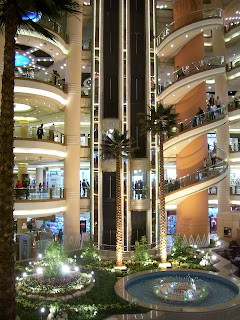And now, for something completely different.
St. Catherine's Monastery and Mount Sinai
Friday morning at 5:30, the minibus we had rented picked us up in Zamalek, and we set off on our trip to Mt. Sinai and St. Catherine's Monastery.
The eight hour trip was broken up by a series of rest stops and short sightseeing excursions, which our two friendly drivers picked out for us. First among them was the sight of the Twelve Wells of Moses, where Moses struck his staff into the ground and twelve wells for the twelve tribes of the Sinai appeared. (Not a story with which I was familiar).

It just so happens that a formation of trees nearby spells out the word الله (Allah). Yeah, I don't see it either...
Next, we saw a cave right by the Red Sea (which is gorgeous, by the way) that emits mysterious steam. I think there might be a demon inside, or perhaps a djinn.
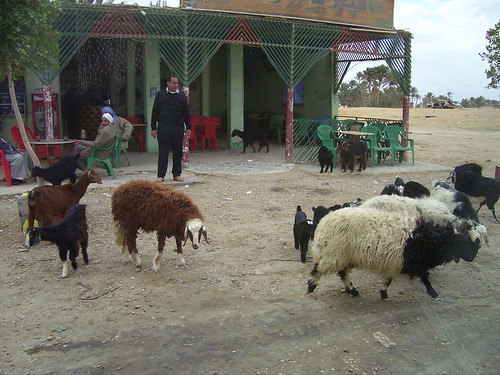
One rest stop was home to a whole flock of adorable goats. A kid had its head stuck in a fence, so I helped it out.
Slowly, the landscape changed from flat desert to dune-shaped hills to craggy rocks to mountains. We had to go through several check points on the Sinai, but we finally got to our hotel, which had spectacular views of the surrounding mountains.
We hauled our luggage into our warm cabins and napped before and after dinner. At 2 a.m., we got a wake-up call from the reception and began donning every item of clothing we owned.
Our drivers picked us up and took us to the entrance point, where we had to pay for a guide and go through security (the Egyptians love their metal detectors, as I learned at the New York consulate, where they use one as a doorbell).
We trudged along towards the foot of the mountain on a sandy path, accompanied by several hundred hardened Teutons and Norsemen, many with miners' flashlights strapped to their foreheads. Only one of our party had thought to bring a light, so we stumbled about in the dark for the most part. The icy wind threatened to unravel the many scarves wrapped around our heads, and my sweat was quickly freezing my neoprene suit to my torso.
We soon passed by a group of men in the dark, who offered, "Camel?"
"Pah," I scoffed, as I tripped over a rock. "We will climb this mountain!"
"Camel?" they suggested again.
We got to the first rest stop, our toes and fingers frozen, with the prospect of seven more kilometers of steep, rocky, freezing (!) hike ahead. So, after much deliberation, Jess and I left Farrell, Sarah and Simone and paid for camels to take us the rest of the way up. (Embarrassing, I know.)
Even so, a starry sky worthy of the biblical setting was the only distraction from the cold, and I spent the undulating ride picking out constellations I had never seen before.
Finally near the top, we were let off our beasts of burden, and proceeded to the nearest shelter, where we waited for the sun to rise. Bundled up in camel hair blankets, we drank tea and chatted with one of the Egyptian guides, who questioned us at great length about Christian doctrine.
Allow me to paraphrase some of his queries.
"Where do you get the face of Jesus?"
"The Orthodox love the Virgin Mary. The Catholics do not, I think. Yes?"
"Is it true that the Virgin Mary never married Joseph? Who then was her husband?"
We were so engaged in conversation that we almost missed the sunrise. But we clambered up onto a nearby crag and gazed out over the mountain tops in time to see Eos emerge. Meanwhile, the frostbite claimed our last toes.
On the way down, the sun was a welcome companion after the coldest night of our lives. We breakfasted back at the hotel and then made our way to the monastery, which is home to both Jethro's Well--where Moses first met his wife--and the Burning Bush, which, according to my guidebook, is a kind of bramble.
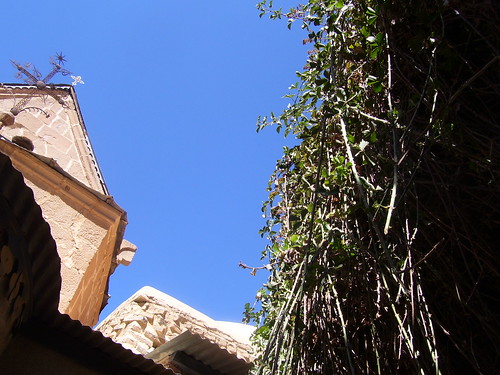
The Burning Bush
It also houses a collection of remarkable icons, including some from the time of the iconoclast controversy, which survived because the prohibition in Byzantium did not reach Egypt. I addressed the monk at the door in Greek and was consequently let in for FREE, which was extremely exciting. I was also able to get my "xeni" friends a discount price.
The monk then asked me for my camera. I handed it over, thinking he wanted to make sure I wouldn't break the ban on photography. It later turned out, however, that he had taken a picture of the famous icon of Christ the Pantokrator for me. He also invited me to stay for the liturgy at twelve, which was when the monastery closed to non-Orthodox visitors. Genuinely regretful, I had to decline, as I couldn't bring my friends along. But I wistfully pictured myself amidst a flock of robed and bearded Greek men, who crossed themselves continuously and swung silver incense burners in a collective frenzy.
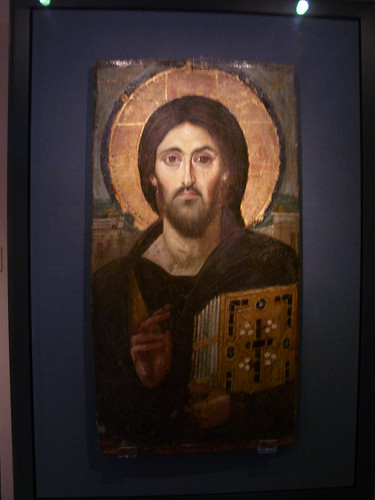
Christos Pantokrator
We embarked on the return journey, this time accompanied by a greasy government official, whose substantial private arsenal was revealed whenever the wind lifted the corners of his tan pin-stripe suit. The recent attacks on tourists have unnerved the authorities, it seems.
Our drivers had one more surprise in store for us: We stopped at Israeli barracks from the occupation in 1967, which had been converted into a "museum." The Egyptian soldier who showed us around asked our drivers to walk ahead of us with him, "just in case there are any land mines."
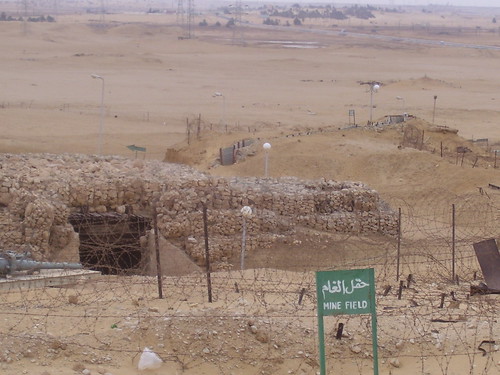
Former Israeli barracks. Please note the sign.
Our drivers and the government lackey excitedly examined dusty machine guns, tubes of toothpaste with Hebrew lettering and embroidered Yarmulkas. We nervously tiptoed about, expecting to be blown up at any moment.
Finally, the soldier asked if there were any Jews among us. It wouldn't matter, he told us. He just wanted to show off Egypt's strength.
But there was really no need. The holy mountain had done so already.














